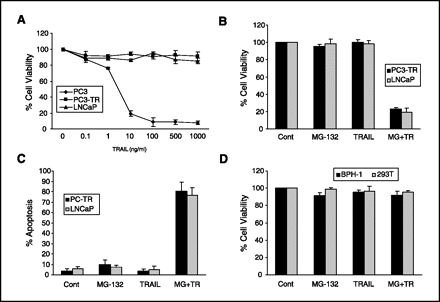Tumor necrosis factor–related apoptosis-inducing ligand (TRAIL) is a promising anticancer agent because it induces apoptosis in cancer cells but not in normal cells.
INTRODUCTION Tumor necrosis factor related apoptosis-inducing ligand (TRAIL) is a promising anticancer agent because it induces apoptosis in cancer cells but not in normal cells.
Unfortunately, some cancer cells develop resistance to TRAIL-induced apoptosis. Therefore, it is clinically relevant to determine the molecular mechanisms that differentiate between TRAIL-sensitive and TRAIL-resistant tumors. Previously, we have shown that the antiapoptotic molecule cellular-FLICE-inhibitory protein long isoform [c-FLIP(L)] is necessary and sufficient to maintain resistance to TRAIL-induced apoptosis. We have found that c-FLIP(L) is transcriptionally regulated by the activator protein-1 (AP-1) family member protein c-Fos. Here, we report that MG-132, a small-molecule inhibitor of the proteasome, sensitizes TRAIL-resistant prostate cancer cells by inducing c-Fos and repressing c-FLIP(L). c-Fos, which is activated by MG-132, negatively regulates c-FLIP(L) by direct binding to the putative promoter region of the c-FLIP(L) gene. In addition to activating c-Fos, MG-132 activates another AP-1 family member, c-Jun. We show that c-Fos heterodimerizes with c-Jun to repress transcription of c-FLIP(L). Therefore, MG-132 sensitizes TRAIL-resistant prostate cancer cells by activating the AP-1 family members c-Fos and c-Jun, which, in turn, repress the antiapoptotic molecule c-FLIP(L).
To sensitize TRAIL-resistant cancer cells, proteasome inhibitors have been combined with TRAIL in a variety of different cancer models. For example, the proteasome inhibitor PS-341 has been shown to help overcome TRAIL resistance in colon and bladder cancer cells. Another proteasome inhibitor, MG-132, has a potent antitumor function and has been shown to sensitize resistant cancer cells to the proapoptotic effects of TRAIL. In this study, we examined the mechanism that MG-132 sensitizes prostate cancer cells to TRAIL-induced apoptosis. We show that MG-132 sensitizes TRAIL-resistant prostate cancer cells by up-regulating the AP-1 family proteins c-Fos and c-Jun, which, in turn, repress the antiapoptotic molecule c-FLIP(L). c-Fos/c-Jun heterodimers bind to the c-FLIP(L) promoter, repress its transcriptional activity, and reduce c-FLIP(L) mRNA and protein levels. These findings suggest that elevated c-Fos and c-Jun can play an important role in determining whether a cell is responsive or resistant to the proapoptotic effects of TRAIL.
Tumor necrosis factor related apoptosis-inducing ligand (TRAIL) is a promising anticancer agent because it induces apoptosis in cancer cells but not in normal cells.
Unfortunately, some cancer cells develop resistance to TRAIL-induced apoptosis. Therefore, it is clinically relevant to determine the molecular mechanisms that differentiate between TRAIL-sensitive and TRAIL-resistant tumors. Previously, we have shown that the antiapoptotic molecule cellular-FLICE-inhibitory protein long isoform [c-FLIP(L)] is necessary and sufficient to maintain resistance to TRAIL-induced apoptosis. We have found that c-FLIP(L) is transcriptionally regulated by the activator protein-1 (AP-1) family member protein c-Fos. Here, we report that MG-132, a small-molecule inhibitor of the proteasome, sensitizes TRAIL-resistant prostate cancer cells by inducing c-Fos and repressing c-FLIP(L). c-Fos, which is activated by MG-132, negatively regulates c-FLIP(L) by direct binding to the putative promoter region of the c-FLIP(L) gene. In addition to activating c-Fos, MG-132 activates another AP-1 family member, c-Jun. We show that c-Fos heterodimerizes with c-Jun to repress transcription of c-FLIP(L). Therefore, MG-132 sensitizes TRAIL-resistant prostate cancer cells by activating the AP-1 family members c-Fos and c-Jun, which, in turn, repress the antiapoptotic molecule c-FLIP(L).
To sensitize TRAIL-resistant cancer cells, proteasome inhibitors have been combined with TRAIL in a variety of different cancer models. For example, the proteasome inhibitor PS-341 has been shown to help overcome TRAIL resistance in colon and bladder cancer cells. Another proteasome inhibitor, MG-132, has a potent antitumor function and has been shown to sensitize resistant cancer cells to the proapoptotic effects of TRAIL. In this study, we examined the mechanism that MG-132 sensitizes prostate cancer cells to TRAIL-induced apoptosis. We show that MG-132 sensitizes TRAIL-resistant prostate cancer cells by up-regulating the AP-1 family proteins c-Fos and c-Jun, which, in turn, repress the antiapoptotic molecule c-FLIP(L). c-Fos/c-Jun heterodimers bind to the c-FLIP(L) promoter, repress its transcriptional activity, and reduce c-FLIP(L) mRNA and protein levels. These findings suggest that elevated c-Fos and c-Jun can play an important role in determining whether a cell is responsive or resistant to the proapoptotic effects of TRAIL.

Fig 1. Cell viability and apoptosis assays after treatment with TRAIL and/or MG-132. Points and columns, an average of at least three independent experiments; bars,SD. A, sensitivity of prostate cancer cells to TRAIL. Cell viability was evaluated by MTS assay after treatment for 24 h with increasing concentrations of TRAIL. The Viability of untreated cells was set at 100%. B,TRAIL-resistant prostate cancer cells, PC3-TR or LNCaP cells, were treated with MG-132, TRAIL, or TRAIL (100 ng/mL) + MG-132 (1 mol/L) for 24 h. Cell viability was evaluated by MTS. C, fluorescence-activated cell sorting analysis for apoptosis after treatment with MG-132 (1 μmol/L), TRAIL (100 ng/mL), or a combination of the two for 24 h. Apoptosis was assessed by FITC-conjugated Annexin V and propidium iodide staining for 15 min at room temperature. The percentage of apoptotic cells was determined by Annexin V stained positive cells. D, cell viability after exposure of nonmalignant benign prostatic hyperplasia (BPH-1) or HEK 293T cells to MG-132 (1 μmol/L), TRAIL (100 ng/mL), or a combination of the two did not induce cell death after 24 h of treatment.
RESULTS MG-132 sensitizes TRAIL-resistant prostate cancer cells to undergo apoptosis. Although PC3 cells are sensitive to TRAIL-induced apoptosis, PC3-TR and LNCaP cells are resistant to the proapoptotic effects of TRAIL. The Combination of TRAIL with MG-132 sensitizes resistant prostate cancer cells, PC3-TR, and LNCaP, to undergo apoptosis. Because TRAIL is more effective against cancer cells than benign immortalized cells, we wished to determine whether the effect of MG-132 + TRAIL is specific to cancer cells or whether immortalized but nontumorigenic cells undergo cell death. Nontumorigenic and immortalized 293T (human embryonic kidney) and BPH-1 (benign prostatic hyperplasia) cells were treated with MG-132, TRAIL, or in combination with MG-132 + TRAIL. We found that neither treatment as single agents nor A combination of treatments promoted cell death in the immortalized noncancerous cell lines. These data suggest that MG-132 is capable of sensitizing cancerous cells, but not benign transformed cells, to undergo TRAIL-induced apoptosis. SOURCES: Wenhua Li, Xiaoping Zhang, and Aria F. Olumi